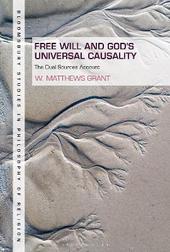
|
Free Will and God's Universal Causality: The Dual Sources Account
Paperback / softback
Main Details
| Title |
Free Will and God's Universal Causality: The Dual Sources Account
|
| Authors and Contributors |
By (author) Professor W. Matthews Grant
|
| Series | Bloomsbury Studies in Philosophy of Religion |
|---|
| Physical Properties |
| Format:Paperback / softback | | Pages:256 | | Dimensions(mm): Height 234,Width 156 |
|
| Category/Genre | Philosophy
Philosophy of religion |
|---|
| ISBN/Barcode |
9781350203655
|
| Classifications | Dewey:234.9 |
|---|
| Audience | | Professional & Vocational | |
|---|
|
Publishing Details |
| Publisher |
Bloomsbury Publishing PLC
|
| Imprint |
Bloomsbury Academic
|
| Publication Date |
17 September 2020 |
| Publication Country |
United Kingdom
|
Description
The traditional doctrine of God's universal causality holds that God directly causes all entities distinct from himself, including all creaturely actions. But can our actions be free in the strong, libertarian sense if they are directly caused by God? W. Matthews Grant argues that free creaturely acts have dual sources, God and the free creaturely agent, and are ultimately up to both in a way that leaves all the standard conditions for libertarian freedom satisfied. Offering a comprehensive alternative to existing approaches for combining theism and libertarian freedom, he proposes new solutions for reconciling libertarian freedom with robust accounts of God's providence, grace, and predestination. He also addresses the problem of moral evil without the commonly employed Free Will Defense. Written for analytic philosophers and theologians, Grant's approach can be characterized as "neo-scholastic" as well as "analytic," since many of the positions defended are inspired by, consonant with, and develop resources drawn from the scholastic tradition, especially Aquinas.
Author Biography
W. Matthews Grant is Professor of Philosophy at University of St Thomas (MN), USA.
ReviewsFree Will and God's Universal Causality is a significant and novel contribution to the philosophical and theological literature on divine providence, in particular the interaction between human and divine agency. The book is clearly written, exceptionally argued, and truly innovative in many ways. * Southeastern Theological Review * Unique, bold, and genuinely innovative. * Thomas P. Flint, Professor of Philosophy, University of Notre Dame, USA * This book makes the best case I have seen for a roughly Thomistic approach to reconciling divine universal causality with libertarian freedom. It is a significant contribution to contemporary philosophy of religion. * Katherin Rogers, Professor of Philosophy, University of Delaware, USA * This is a careful, well-argued book. In addition to making a powerful case that a creaturely action can be caused by God and still free in the libertarian sense, it sheds new light on a host of debates concerning divine and human agency (including God's role in sin, the free will defense, and the nature of providence, grace, and predestination). Highly recommended. * Jeffrey E. Brower, Professor of Philosophy, Purdue University, USA *
|